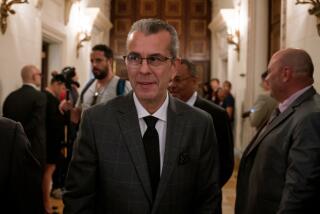U.N. Rejects Halt in Cambodian Vote Counting : Asia: The ruling party cites ‘irregularities.’ It is running neck and neck with royalists.
- Share via
PHNOM PENH, Cambodia — A pall of uncertainty clouded Cambodia’s national elections Monday when the ruling party asked the United Nations to suspend announcement of results because of what it called “irregularities” in the voting.
But the United Nations, which conducted the six-day elections last week, rejected the call and published new figures that showed the Phnom Penh administration in a neck-and-neck race with the opposition royalist party.
According to the figures, U.N. officials had counted 1.82 million votes, about 43% of the ballots cast. The Phnom Penh regime’s Cambodian People’s Party polled 35.3%, and the royalist party, which is known as FUNCINPEC, received 36.7%.
But the elections, which will choose a new 120-seat Parliament, will be decided on the basis of proportional representation in each of the country’s 21 provinces. On a provincial basis, the partial returns suggested that the two parties were close to a tie.
U.N. officials said privately that bad news awaits the Phnom Penh administration in the next few days as such vote-rich provinces as Kompong Cham, Siem Reap and Battambang report final results. These provinces were going heavily toward FUNCINPEC, a fact known to all the parties because party agents are present at the counting.
Even before the counting started Saturday, there were widespread concerns that the Vietnamese-installed Phnom Penh administration might refuse to hand over power if its candidates did badly in the elections.
The announcement that the party was calling on the United Nations to suspend further reports of returns could be a gambit to prepare the groundwork for a rejection of the results, but the United Nations, the United States and other powers have already certified that the elections were, on balance, free and fair.
More than 22,000 U.N. troops and civilian officials presided over the elections, which arose from an October, 1991, peace treaty signed by the four warring factions in the country.
Sok An, a former deputy foreign minister and the chief spokesman for the Cambodian People’s Party, told a news conference Monday that the party has asked Yasushi Akashi, head of the U.N. peacekeeping operation here, to suspend the release of voting results.
“The reason is that there are irregularities in the conduct of the elections,” Sok An said, warning that further broadcast of the results by the United Nations while the charges are being investigated could “be a problem.”
Sok An listed four broad irregularities that he said took place during the elections: party agents could not watch ballot boxes at night in so-called safe havens; some seals were broken on ballot boxes, apparently during transportation; invisible ink used to prevent fraud could reportedly be washed off, and Cambodian polling station employees working for the United Nations allegedly showed bias.
Akashi heard most of the complaints last week yet still certified the elections as free and fair Saturday, as did the U.S. State Department, China and the European Community.
The Phnom Penh administration controls about 80% of the country and fields the largest of the four armies in Cambodia. U.N. officials concede that they have little power to force the government to accept the results and hand over the reins of power except the threat that the regime would face international isolation if it tried to ignore the outcome.
The new Parliament, sitting as a constituent assembly, is to draft a new constitution for the country and then form a new government. With the voting fairly evenly split, neither the Phnom Penh regime nor FUNCINPEC--a French acronym for the National United Front for an Independent, Neutral, Peaceful and Cooperative Cambodia--could impose its will on the other. But it is unclear how deadlocks can be resolved.
More to Read
Sign up for Essential California
The most important California stories and recommendations in your inbox every morning.
You may occasionally receive promotional content from the Los Angeles Times.













